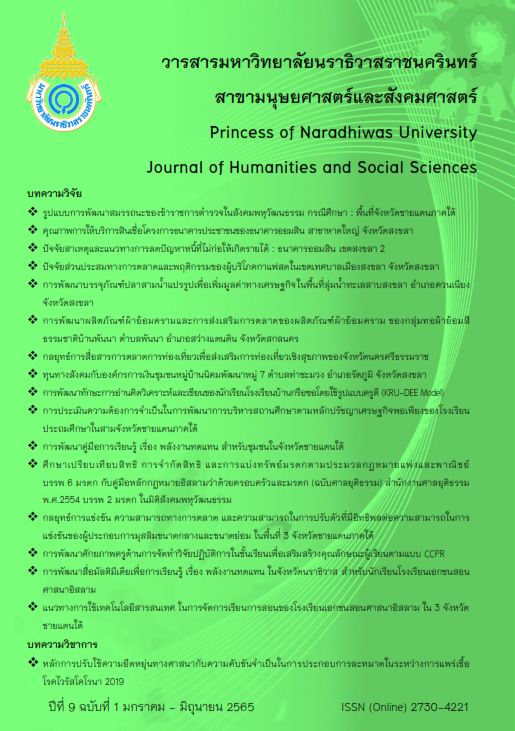Development of Teachers’ Potential in Conducting a Classroom Action Research to Enhance Learners’ Characteristics based on CCPR Model
Main Article Content
Abstract
The purposes of the study were 1) to study problems in conducting classroom action research of school teachers working under Chaiyaphum Secondary Educational Service Area Office in the year of 2019, 2) to improve the teachers’ potential in conducting a classroom research which consists of the ability in designing instructional system to enhance students’ characteristics based on CCPR model, the ability in writing a research proposal and the ability in writing a research paper which all task must receive a high standard level or above. The sample were 50 teachers teaching in 8 subjects from 5 schools under Chaiyaphum Secondary Educational Service Area Office. Tools used were 1) 3 sets of practice kits, and 2) an evaluation form (divided in 3 parts). Statistics used were , S.D., percentage and result interpretation of average criteria.
The findings showed that 1) 54 percent of teachers were able to design their instructional system for the classroom action research, 23 percent of teachers were able to write the research proposal before conducting their classroom action research and 10 percent of teachers succeed in publishing their research paper in journals, 2) teachers could design the instructional system to promote learners’ characteristics with a high level (X = 4.89, S.D. =0.32), 3) teachers could write the research proposal with a high level (X = 4.91, S.D. = 0.23), and 4) teachers could write the research papers and published in academic journals with a high level. (X=4.87, S.D. =0.30).
Article Details

This work is licensed under a Creative Commons Attribution-NonCommercial-NoDerivatives 4.0 International License.
References
ชนาธิป พรกุล. (2561). กระบวนการสร้างความรู้ของครู:กรณีการสอนบูรณาการ. กรุงเทพฯ: สำนักพิมพ์แห่งจุฬาลงกรณ์มหาวิทยาลัย.
ชัยวัฒน์ สุทธิรัตน์. (2559). 80 นวัตกรรมการจัดการเรียนรู้ที่เน้นผู้เรียนเป็นสำคัญ (พิมพ์ครั้งที่ 7). นนทบุรี: พี บาลานซ์ดีไซด์แอนปริ้นติ้ง.
บุญชม ศรีสะอาด. (2545). การวิจัยเบื้องต้น (พิมพ์ครั้งที่ 7). กรุงเทพฯ: สุวีริยาสาส์น.
ไพฑูรย์ สินลารัตน์. (2561). ปรัชญาการศึกษาเบื้องต้น (พิมพ์ครั้งที่ 12). กรุงเทพฯ: โรงพิมพ์แห่งจุฬาลงกรณ์มหาวิทยาลัย.
ภัทราพร เกษสังข์. (2559). การวิจัยปฏิบัติการ. กรุงเทพฯ: โรงพิมพ์แห่งจุฬาลงกรณ์มหาวิทยาลัย.
เรวัติ สวัสดิ์. (2555). การวิจัยเชิงปฏิบัติการเพื่อพัฒนาศักยภาพครูในการทำวิจัยปฏิบัติการในชั้นเรียนโรงเรียนอุดมพัฒนาศึกษา สำนักงานเขตพื้นที่การศึกษามัธยมศึกษา เขต 22 (วิทยานิพนธ์ คุรุศาสตร์มหาบัณฑิต). มหาวิทยาลัยราชภัฏสกลนคร, สกลนคร.
วรรณดี สุทธินรากร. (2563). การวิจัยเชิงปฏิบัติการในชันเรียน “เพื่อสร้างความหมายใหม่ในการเรียนรู้”. กรุงเทพฯ: สำนักพิมพ์สยามปริทัศน์.
วิจารย์ พานิช. (2556). วิธีสร้างการเรียนรู้เพื่อศิษย์ (พิมพ์ครั้งที่ 3). กรุงเทพฯ: มูลนิธิสดศรี สฤษดิ์วงศ์.
สำนักงานคณะกรรมการการศึกษาแห่งชาติ. (2540). พระราชบัญญัติการศึกษาแห่งชาติ พ.ศ. 2542 แก้ไขเพิ่มเติม (ฉบับที่ 2) พ.ศ.2545. กรุงเทพฯ: โรงพิมพ์โอเดียนสแควร์.
สำนักงานเลขาธิการสภาการศึกษา. (2560). แผนการศึกษาแห่งชาติ พ.ศ. 2560-2579. กรุงเทพฯ: พริกหวาน กราฟฟิค.
สุทธิพงษ์ เวียงพรมมา. (2559). การพัฒนาศักยภาพครูในการจัดการเรียนรู้ กลุ่มสาระการเรียนรู้ภาษาไทย โรงเรียนบ้านงิ้วศิริราษฎร์บำรุง สังกัดสำนักงานเขตพื้นที่การศึกษาประถมศึกษาสกลนคร เขต 1. (ปริญญาครุศาสตรมหาบัณฑิต สาขาบริหารการศึกษา). มหาวิทยาลัย ราชภัฏสกลนคร, สกลนคร.
สิทธิพล อาจอินทร์. (2562). ศาสตร์และศิลป์การจัดการเรียนรู้ในศตวรรษที่ 21. ขอนแก่น: โรงพิมพ์มหาวิทยาลัยขอนแก่น.
Breeding, R.R. (2008). Empowerment as a function of contextnal self-understanding. Rehabilitation Counseling Bulletin, 51(11), 96-106.
Likert, R. (1970). Techniqne for the measurement of attitudes. In G.F. Summer (Ed.) Attitudes measurement. New York: Rand Me Nally.
MeMiff, L. (2000). Virtual Professionalism and the Challenge For Irish Educators. Irish Educational Studies, 19(1), 139-150.


